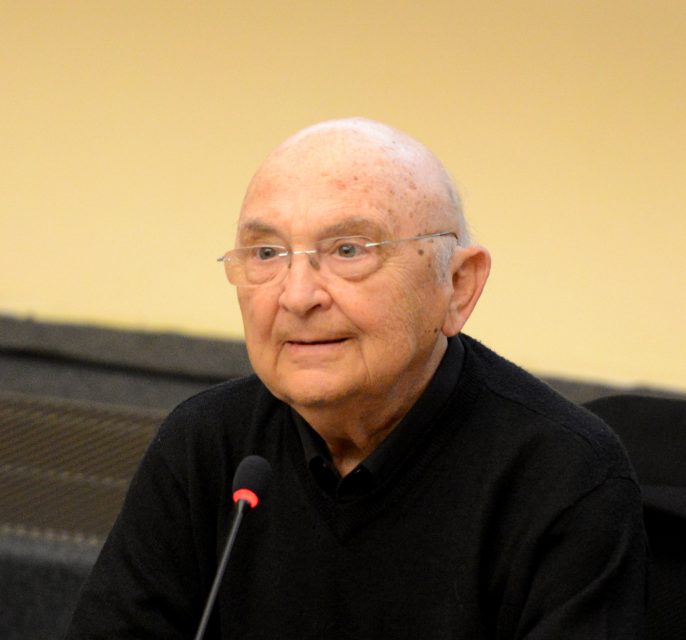
Aharon Appelfeld (1932-2018)
We need to talk about what President Trump said last night about those “s-hole countries.”
The inhabitants of which just happen to be black.
As opposed to Norway.
The inhabitants of which just happen to be oh, hmnn — white.
About as white as it gets.
Nordic supremacy, anyone?
Simply put: Aharon Appelfeld would be screaming right now,
Aharon Appelfeld, who published more than 45 books in Hebrew and which were translated into many languages, and whose most recent book was published three months ago, died last week at the age of 85. Among his best known books are: The Age of Wonders, Badenheim 1939, To the Land of the Cattails, and The Healer.
I already miss him. I already miss his voice. Right now, he would be screaming.
Yes, Appelfeld was a “Holocaust writer.” But, he was not like any other Holocaust writer.
Appelfeld was born in Romania-now-the Ukraine. His mother was murdered by the Nazis when he was about 8 and he and his father were sent on a forced march to the Transnistria labor camp. Appelfeld escaped the camp and hid for two years.
In the words of my friend, Thane Rosenbaum:
He lived among and was helped along by horse thieves, fortune-telling Gypsies, self-described witches and working-girl prostitutes. He became a shepherd and a caretaker of lame horses. Later he worked as a cook for the Soviet army. All this before a bar mitzvah he was still too young to have and, given everything else, God would not have noticed.
A prostitute became his surrogate mother. Each night, he once told me, in a studio flat through the scrim of a hanging bedsheet that separated his tiny bed from the larger one of his caretaker, all made luminous by ambient light, he watched his guardian angel sexually satisfy her drunken clientele — the boy observing through the projected screen, hearing the moans and grunting sounds, seeing shadowy movements that ushered him into accelerated puberty. In the upside-down world of the Nazis, this kindhearted prostitute became his Mother Theresa.
He then joined the Soviet Army, where he traveled to Bulgaria. Following World War II he spent time in a Displaced Persons Camp in Italy, and then joined a group of children with no parents in immigrating to Palestine in 1946.
Appelfeld won the Israel Prize for literature in 1983, and twice received the Prime Minister’s prize, as well as with the Brenner Prize for literature in 1975, and the Bialik Prize for literature in 1979. He was shortlisted as a finalist for the Man Booker International Prize for 2013.
But, there is far more.
As far as I can tell, only Thane Rosenbaum has noticed what distinguished Appelfeld from other writers on the Holocaust. Simply put: he did not focus on the horror. Mostly, on the pre-horror.
His characters are assimilated, affluent, mostly central European Jews — as were his parents. In his words:
My parents, they were Jewish people, they have never denied that they are Jewish, no. But then they were, they were somewhere else, it was not even an openly critical stance. They said, leave me alone. I cannot go to the synagogue, I cannot pray. Leave me alone.
My parents were people with a split, maybe many splits, in their lives. From one side, they were devoted to the German language, German culture. Both of them completed the Latin gymnasium. So they could read Latin texts and Greek texts. They were rooted in the history of that. But on the other side, they also wanted to be rooted somewhere in Jewishness.
Appelfeld’s characters believe themselves to be too rich, too comfortable, too cultured, to confront the coming horror. They simply cannot get their minds around what is happening, or is about to happen.
To quote Thane:
Appelfeld’s characters live out their days in advance of the oncoming devastation, seemingly oblivious to what lies ahead, naively focusing on trivial details instead of the Nazi menace that would soon nearly erase all of Jewish life in Europe.
It can’t happen here. Oh, not to us. We would never, ever elect someone who would say such a thing.
Just go to the Torah portion, Vaera, which begins the narrative about the plagues that hit Egypt.
You know the drill: dam, blood; tzfardea, frogs; kinim, locusts…..
We always translate tzfardea as “frogs, ”but that’s not exactly right.
Va-taal ha-tzfardea vatkas et eretz Mitzrayim – literally: “And the frog arose and it covered the whole land of Egypt.
Not “frogs,” but “frog.” One frog!
The rabbinic interpretations are either delightful or monstrous
Rabbi Akiba said: “It was one frog that appeared, but it gave birth to countless other frogs that soon filled every part of the land of Egypt.”
Rabbi Elazar said: “Actually, it was one large frog that made a rather harsh croak, and countless hidden frogs suddenly appeared and covered all the land.” (Talmud, Sanhedrin 67b)
The frog of racism and bigotry is making a very loud croak. It starts as one frog, and then it multiplies.
Aharon Appelfeld would have understood.
Do we?






